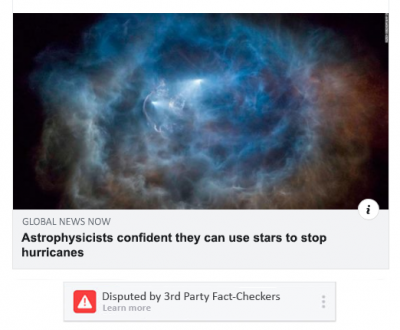Algorithmic Literacy & Algorithmic Transparency
All social media apps, and many other online services, now use algorithms to determine what content their users see. The question is: How aware are users of these algorithms? This new project aims to formalize the study of algorithmic literacy, in terms of its definition, its measurement, and what it tells us about what users know.
Related publications / presentations
Oeldorf-Hirsch, A., & Neubaum, G. (2025). What do we know about algorithmic literacy? The status quo and a research agenda for a growing field. New Media & Society, 27(2), 681-701. https://doi.org/10.1177/14614448231182662
Pierre, L. & Oeldorf-Hirsch, A. (2024, August). Exploring how internet literacy and algorithmic awareness influence passive and active social media engagement behavior. Paper presented at the 107th annual conference of the Association for Education in Journalism & Mass Communication (AEJMC), Philadelphia, PA.
Oeldorf-Hirsch, A., Romann, L., Witkowich, I., & Chen, J. (2024, June). “It’s like they are spying on me”: Assessing social media users’ perceptions of algorithmic transparency. Paper presented at the 74th annual conference of the International Communication Association (ICA), Gold Coast, Australia.
Oeldorf-Hirsch, A. & Neubaum, G. (2023). Attitudinal and behavioral correlates of algorithmic awareness among German and U.S. social media users. Journal of Computer-Mediated Communication, 28(5). https://doi.org/10.1093/jcmc/zmad035
Funding
Fulbright Fellowship (2021), Fulbright U.S. Scholar Program with Fulbright Germany. Hosted at Universität Duisburg-Essen: €14,400.
Social media user experience with algorithmic transparency cues (PI, 2023). Scholarship Facilitation Fund, Office of the Vice President of Research, University of Connecticut: $2,000.
Assessing predictors of algorithmic literacy across U.S. and German social media users (PI, 2022). SFF, OVPR, UConn: $2,000.
News and Mis/Disinformation on Social Media
The majority of Internet users now get at least some of their news through social media apps. My initial research exploring this, starting in 2010, looked at how users assess learn from and assess the credibility of news they find on social media. Given the growing problem with misinformation and disinformation, particularly since 2016, more recent work has focused on how to combat this with literacy interventions and design changes.
Select publications / presentations
Oeldorf-Hirsch, A., Schmierbach, M., Appelman, A., & Boyle, M. P. (2023). The influence of fact-checking is disputed! The role of party identification in processing and sharing fact-checked social media posts. American Behavioral Scientist, 0(0). https://doi.org/10.1177/00027642231174335
Oeldorf-Hirsch, A., & Srinivasan, P. (2022). An unavoidable convenience: How post-Millennials engage with the news that finds them on social and mobile media. Journalism, 23(9), 1939-1954. https://doi.org/10.1177/1464884921990251
Oeldorf-Hirsch, A., Schmierbach, M., Appelman, A., & Boyle, M.P. (2020). The ineffectiveness of fact-checking labels on news memes and articles. Mass Communication and Society, 23(5), 682-704. https://doi.org/10.1080/15205436.2020.1733613
Oeldorf-Hirsch, A. & DeVoss, C. (2020). Who posted that story? Processing layered sources in Facebook news posts. Journalism & Mass Communication Quarterly¸ 97, 141-160. https://doi.org/10.1177/1077699019857673
Oeldorf-Hirsch, A., (2018). The role of engagement in learning from active and incidental news exposure on social media. Mass Communication and Society, 21, 225-247. https://doi.org/10.1080/15205436.2017.1384022. Winner of the 2019 AEJMC Mass Communication and Society Division Article of the Year Award.
Funding
Social media literacy interventions for climate change misinformation (Co-PI; Schmierbach, Appelman, & Boyle). News Literacy Fund, College of Communications, Pennsylvania State University: $4,000.

Science Communication & Women in STEM on TikTok
This research area started as a collaboration with researchers in Ecology and Evolutionary Biology, Journalism, and Education. The purpose was to assess the training methods used in a joint graduate STEM/undergraduate journalism science communication course in which scientists are trained to communicate their research to the public via media. It has since grown to assessments of science communication / communicators on social media, particularly women in STEM as content creators on platforms like TikTok.
Related publications / presentations
Suk, J., Steinke, J., Holland Levin, S., Schnitzer, K.A., Gilbert, C., Oeldorf-Hirsch, & A., Coletti, A. (2025, June). Trending women in STEM: Digital space-making and visual presentation of identities on TikTok. Paper to be presented at the 75th annual conference of the International Communication Association (ICA), Denver, CO.
Steinke, J., Gilbert, C., Coletti, A., Levin, S. H., Suk, J., & Oeldorf-Hirsch, A. (2024). Women in STEM on TikTok: Advancing visibility and voice through STEM identity expression. Social Media + Society, 10(3). https://doi.org/10.1177/20563051241274675
Coletti, A., McGloin, R., Oeldorf-Hirsch, A., & Hamlin, E. (2022). Science communication on social media: Examining cross-platform behavioral engagement. The Journal of Social Media in Society, 11(2), 236-263. https://thejsms.org/index.php/JSMS/article/view/995
Capers, R. S., Oeldorf-Hirsch, A., Wyss, R., Burgio, K. R., & Rubega, M. A. (2022). What did they learn? Objective assessment tools show mixed effects of training on science communication behaviors. Frontiers in Communication, 6(February), 1–11. https://doi.org/10.3389/fcomm.2021.805630
Rubega, M. A., Burgio, K. R., MacDonald, A. A. M., Oeldorf-Hirsch, A., Capers, R. S., & Wyss, R. (2020). Assessment by audiences shows little effect of science communication training. Science Communication, Online First. https://doi.org/10.1177/1075547020971639
Funding
Training STEM graduates to communicate in the digital age, and measuring whether it works (Senior Personnel; PI Rubega). National Science Foundation Research Traineeship (NRT) Program, 8/1/2015-7/31/2018; $500,000
Promoting equity, inclusion, and belonging: Examining women in STEM on TikTok (Co-PI; Steinke & Suk, 2022). Research in Academic Themes 2022 Funding Initiative, College of Liberal Arts & Sciences, UConn: $50,000.
Additional Select Publications
Meier, Y., Oeldorf-Hirsch, A., & Krämer, N. C. (2023). Who is targeting me? Privacy perceptions of and responses to commercial and political targeted advertising on social media. Journal of Advertising, 1-18. https://doi.org/10.1080/00913367.2023.2275776
Oeldorf-Hirsch, A., & Chen, Y. (2022). Mobile mindfulness: Predictors of mobile screen time tracking. Computers in Human Behavior, 129, 107170. https://doi.org/10.1016/j.chb.2021.107170
Oeldorf-Hirsch, A., & Gergle, D. (2020). ‘Who knows what’: Audience targeting for question asking on Facebook. Proceedings of the ACM on Human-Computer Interaction, 4(GROUP), 20 pages. https://doi.org/10.1145/3375191
Obar, J. A. & Oeldorf-Hirsch, A. (2020). The biggest lie on the Internet: Ignoring the privacy policies and terms of service policies of social networking services. Information, Communication & Society, 23, 128-147. https://doi.org/10.1080/1369118X.2018.1486870
Oeldorf-Hirsch, A., High, A. C., & Christensen, J. L. (2019). Count your calories and share them: Health benefits of sharing mHealth information on social networking sites. Health Communication, 34, 1130-1140. https://doi.org/10.1080/10410236.2018.1465791
Oeldorf-Hirsch, A. & McGloin. R. (2017). Identifying the predictors of participation in Facebook pictivism campaigns. Social Media + Society, 3(3), 1-11. https://doi.org/10.1177/2056305117727637
High, A., Oeldorf-Hirsch, A., & Bellur, S. (2014). Misery rarely gets company: The influence of emotional bandwidth on supportive communication on Facebook. Computers in Human Behavior, 34, 79-88. https://doi.org/10.1016/j.chb.2014.01.037
Full CV: http://bit.ly/aoh_cv

